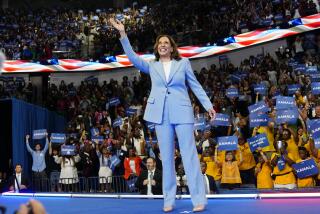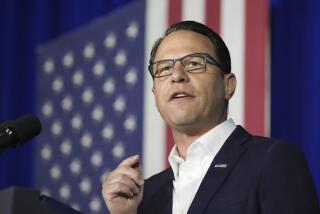Editorial: Joe Biden needs competence — not sizzle — from his vice presidential running mate
- Share via
With the Democratic presidential nomination within his grasp, former Vice President Joe Biden must make a decision that presidential candidates always insist that they take seriously but often don’t: the selection of a running mate. Biden says he will soon announce members of a committee to screen potential candidates for that role.
We already know one thing about Biden’s choice: It will be a woman. That commitment still leaves Biden with an array of qualified potential partners, but, like every presidential candidate, he will be exhorted to consider attributes other than the two that should be uppermost in his mind: whether his pick would be qualified to assume the presidency at a moment’s notice and whether in that event she would continue the policies he championed.
Some will urge Biden to make a choice that would represent another olive branch to his defeated rival Bernie Sanders and Sanders’ passionate, often young, supporters. Others will advocate that he choose a running mate who would be likely to deliver voters in her home state, especially if it’s one that President Trump carried or ran well in four years ago.
Biden will also be pressed to seek ethnic or racial balance, for example by naming an African American running mate who could energize a loyal Democratic constituency. One such potential choice, former Georgia gubernatorial candidate Stacey Abrams, has disdained false modesty by suggesting that she would be an “excellent running mate” for the former vice president.
Biden himself has floated an additional factor: skills or experience that would complement his strengths and compensate for his weaknesses. According to Biden, that approach was recommended to him by former President Obama.
We believe, however, that Biden’s primary criteria for a running mate should be ability and compatibility.
We would urge any prospective presidential nominee to set these priorities, but it’s especially important for Biden to do so. Although in good health, if elected he would be 78 when he was inaugurated for what very likely would be a single term. (Biden has not committed to serve only four years, yet he reportedly indicated to aides that he probably wouldn’t seek reelection.) If he indeed served only one term, his vice president would be a favorite for the Democratic presidential nomination in 2024.
But Biden’s age isn’t the only reason for him to choose carefully. When presidential candidates have allowed other criteria to drive the selection of a running mate, the results often have been unfortunate, even disastrous. It was supposed to be a “game changer” when Republican presidential nominee John McCain, a seasoned U.S. senator and foreign policy expert, chose Alaska’s then-Gov. Sarah Palin as his running mate in 2008. It soon emerged that Palin was not only woefully unsuited for national office, but practiced a style of pandering populist politics that was alien to McCain’s appreciation of the responsibilities of government.
The Palin fiasco is a reminder of what happens when novelty or “excitement” becomes the primary factor in selecting a running mate. But there are less dramatic examples of mismatches, including then-Vice President Walter Mondale’s selection of the obscure Rep. Geraldine Ferraro in 1984 — an early exercise in gender balance that saddled the campaign with unwelcome controversy — or George H.W. Bush’s selection four years later of the youthful (and more conservative) Sen. Dan Quayle of Indiana, who proved himself in office to be “no Jack Kennedy.”
Nor is it clear that an ideologically or geographically “balanced ticket” is a recipe for victory. Some believe that John F. Kennedy secured a crucial victory in Texas and other Southern states in 1960 by asking Sen. Lyndon B. Johnson to be his running mate. (Johnson later said Kennedy himself held that view.) But Kennedy’s victory in those states also reflected the lingering dominance of the Democratic Party in that region. Among the conflicting accounts of why Ronald Reagan chose George H.W. Bush, a defeated opponent, as his running mate in 1980 is that the more moderate Bush provided ideological balance for the conservative Reagan. But Reagan’s overwhelming victory over unpopular incumbent Jimmy Carter undermines the notion that Reagan’s choice of a running mate made much difference.
Indeed, research suggests that, whether they are chosen because of gender, geography or ideology, vice presidential candidates probably don’t exert significant influence over most voters’ choice for president, though voters may lose confidence in a presidential candidate who chooses a running mate perceived as incompetent. Even the popular notion that vice presidential candidates will carry their home states for the ticket has been questioned, although a recent study suggests there might be such an advantage.
We’re not suggesting that Biden should totally ignore other factors in making his selection, including personal chemistry, party unity and the possibility that a particular candidate might make the difference in the outcome in a particular state or region. But these should be secondary considerations. Fortunately, the Democratic Party includes many officeholders with the right amounts of experience and demonstrated expertise, including some of Biden’s primary campaign rivals, who potentially would be productive partners for a President Biden.
When he announced that he would ask Biden to be his running mate, Obama described the longtime Delaware senator as “a statesman with sound judgment who doesn’t have to hide behind bluster to keep America strong.” Substitute “stateswoman” for “statesman” and that is the job description that should guide Biden in making this momentous decision.
More to Read
A cure for the common opinion
Get thought-provoking perspectives with our weekly newsletter.
You may occasionally receive promotional content from the Los Angeles Times.










